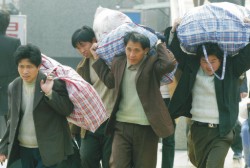Human Rights Advocacy
Living in the Shadows
The human rights of migrants
 Migrant workers are also human beings. Why don't they pay for my work? I cannot go home because I don't have money. I have chosen to kill myself as there is no other way.” --this word found on a note left by Jeong Yu-hong, a 34-year-old migrant worker from China, living in South Korea.
Migrant workers are also human beings. Why don't they pay for my work? I cannot go home because I don't have money. I have chosen to kill myself as there is no other way.” --this word found on a note left by Jeong Yu-hong, a 34-year-old migrant worker from China, living in South Korea.
The promise of a better standard of living for their families pushes many people into irregular migration, if legal avenues are not available to them. Every year thousands die while trying to reach other countries.
Many of those who arrive in a new country face further abuse and exploitation at the hands of traffickers, unscrupulous employers and state officials. Migrants who lack official status and the protection of the law are often denied the right to education, health and housing and are condemned to live and work in appalling and degrading conditions.
Women constitute almost fifty per cent of migrant workers, and are particularly vulnerable to exploitation, including sexual violence. Children, too, face particular hardships and are at risk of exploitation due to their young age, immaturity and, in some cases, lack of parental support.
Migrants are often described, by some politicians and the media, as criminals, economic burdens, security threats and even a risk to public health. The reality is, however, that many economies have come to rely on migrants who are prepared to work in degrading and dangerous jobs with little security and low wages.
This unrecognized, unappreciated, and undervalued workforce now drives a significant part of the global economy. A migrant worker is increasingly being viewed as a commodity or a unit of labour, a "temporary service provider" who can be shuttled around the world at will. This attitude lacks any recognition of a migrant worker's human rights.
Migrants' rights are human rights; and governments, communities, employers and individuals need to do more to uphold and protect them.
The Amnesty International (AI) Primer on the human rights of migrants presents an overview of the issues, and outlines how government policies and practices should protect migrant workers' human rights at all stages in the cycle of migration across the world.
It highlights some of the human rights violations that many migrants face, and sets out an agenda for campaigning for migrants' rights, including calling on States to ratify and implement the Migrant Workers Convention. It also celebrates migrant workers' contributions to both the host country and to their families in their countries of origin.
Dispelling fear and countering misinformation are a vital part of promoting migrants' rights. At the heart of AI's proposed agenda for campaigning for migrants' rights is a call to treat all migrants with full respect for their human rights and human dignity.
“This silent human rights crisis shames our world…Migrants are part of the solution, not part of the problem. They should not be made the scapegoats for a vast array of social ills.”--Kofi Annan,UN Secretary General in an address to the European Parliament, 29 January 2004.
Source: Amnesty International.